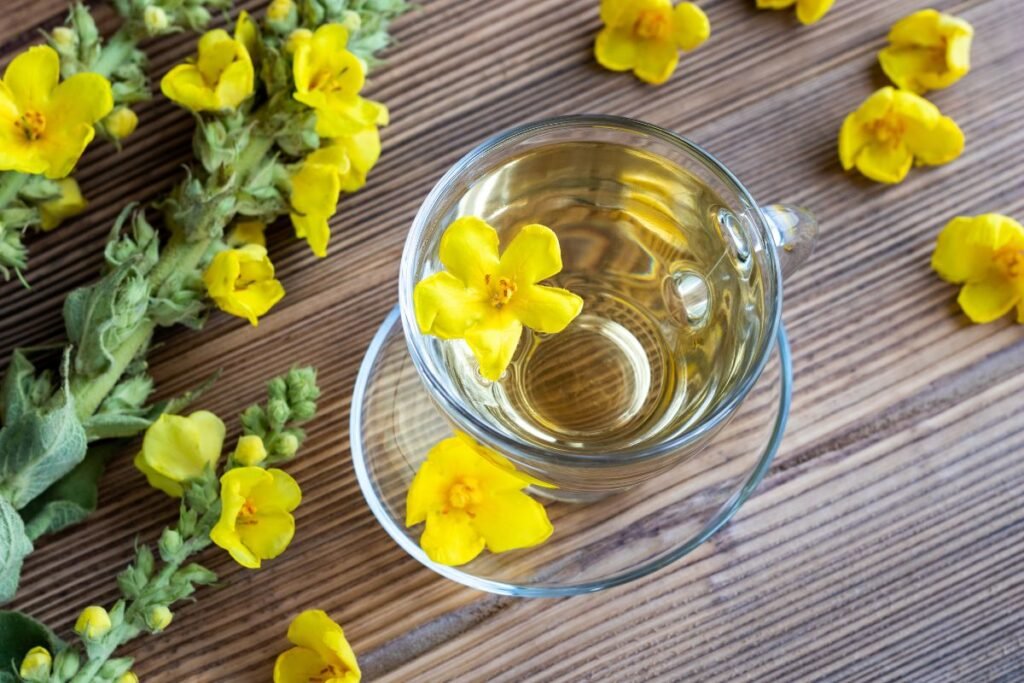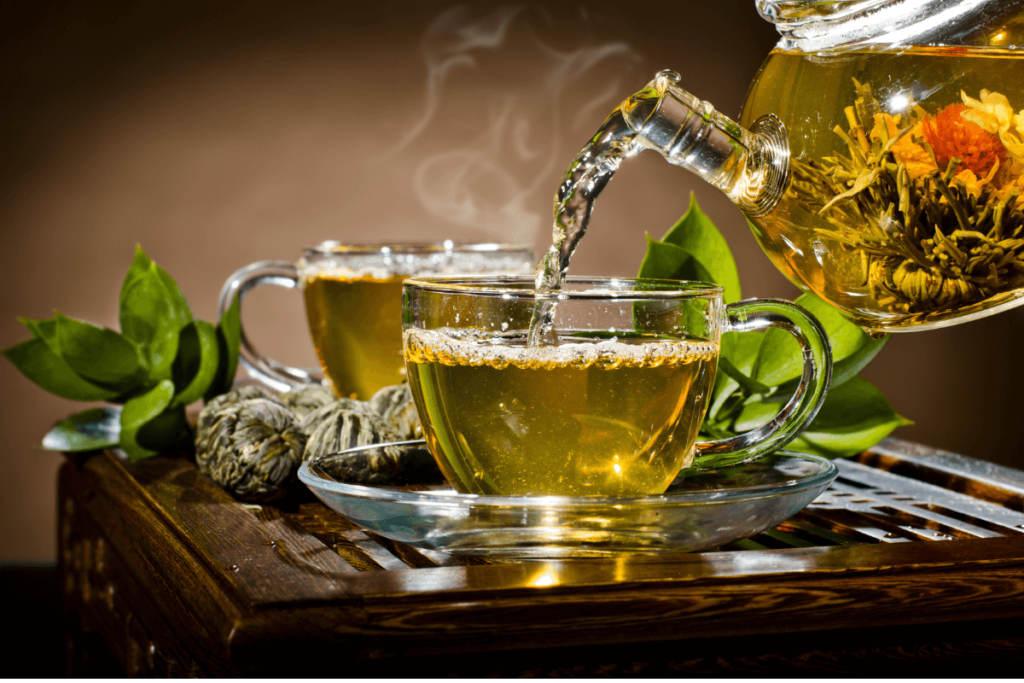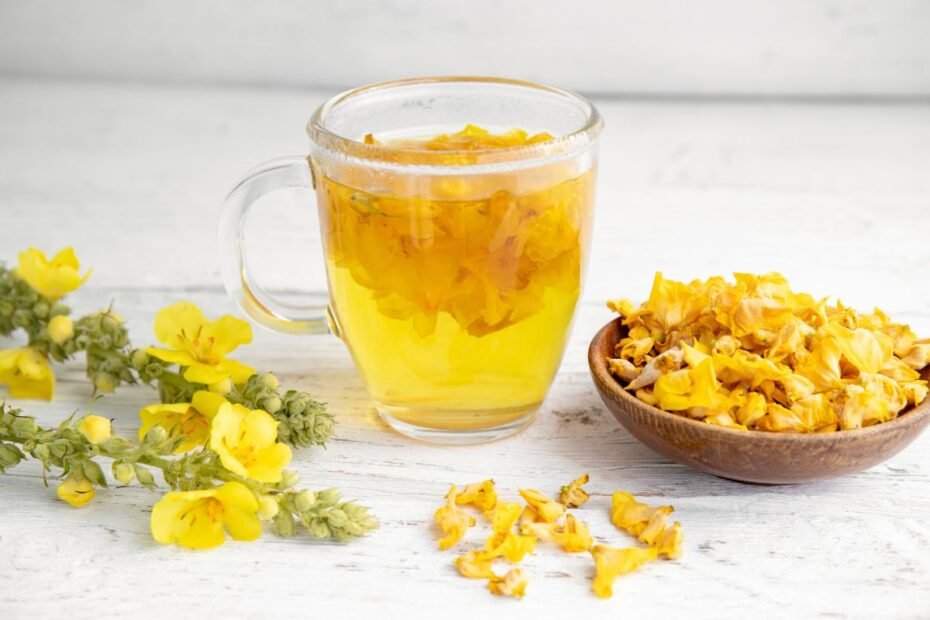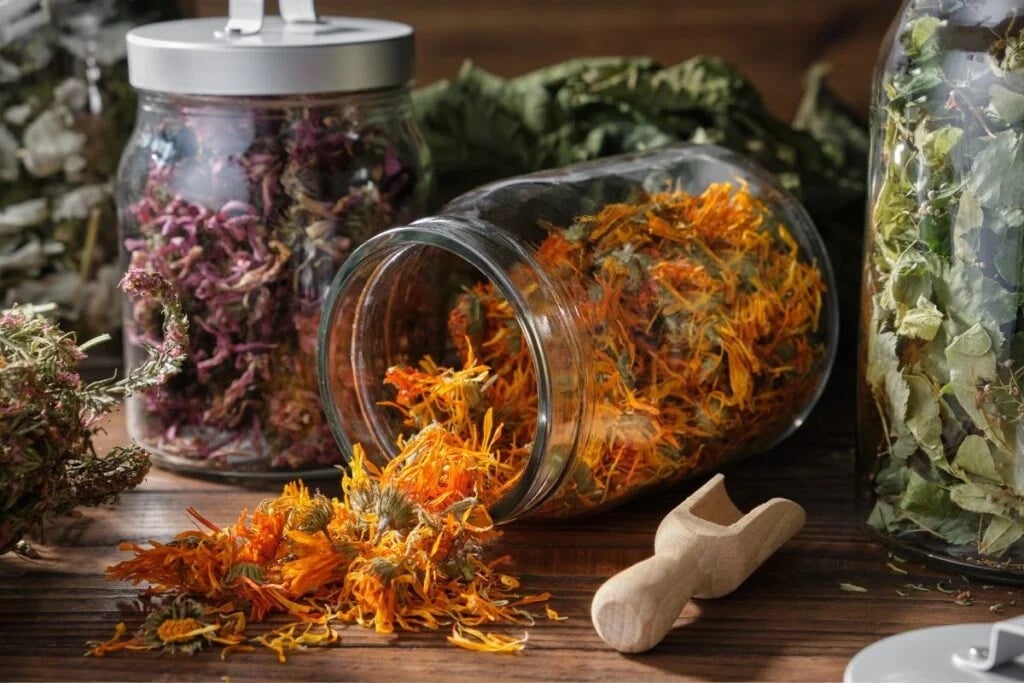In recent years, mullein tea has become a popular beverage for treating the symptoms of asthma. However, did you know its usage as a go-to herbal remedy dates back centuries?
Today, we uncover the benefits of mullein tea based on scientific studies by researchers. By the end of this article, you’ll find out why people love this minty tea. Let’s dive in!
What Is Mullein Tea?
Mullein tea is an herbal beverage great for cough, congestion, asthma, and bronchitis. It comes from the common mullein plant (Verbascumthapsus), which is in the snapdragon family.
The Mullein plant originated from the Eastern Mediterranean Basin but is now in mountainous areas in North America. For some, mullein is a weed, but for others, it’s a lifesaver!
To harvest Mullein tea, farmers cut the bottom leaves from the stem and use them fresh or dried in various products. You can take the plant’s flowers and roots and make mullein oil to remedy eczema.

Mullein Tea Throughout History
Mullein tea is a traditional herbal plant used in Pakistan and Turkey for fighting certain infections. In Spanish folk medicine, mullein is used to treat circulatory, digestive, and respiratory systems.
Meanwhile, the indigenous people and colonists gave mullein tea to those with coughs and open wounds. They did this by smoking its leaves or making syrup from its roots.
Because of more recent studies on its effectiveness, mullein is now becoming more popular. Today, you can find mullein tea across health stores in the United States!
What Are the Benefits of Mullein Tea?
Below are 3 benefits of drinking mullein tea.
1. For Asthma
One of the most popular uses of mullein tea is for alleviating asthma symptoms. Research shows that mullein can suppress cough by reducing inflammation in the airways.
What’s more, mullein is an expectorant that loosens mucus in the airways, making it perfect for treating asthma!
2. For Heart Disease
Studies show that the most valuable compound in mullein tea is coumarin. Natural coumarin has anti-inflammatory, anti-viral, and anti-bacterial properties.
It’s also effective as an anticoagulant in blood. Because of this, research suggests that mullein can prevent heart disease and stroke.
3. For Preventing Cancer
In 2020, a study on the mullein plant showed that it can inhibit 91.31% of DPPH free radicals if administered in concentrations of 300 mg/l. On top of this, many types of bacteria were sensitive to the medicinal plant.
Mullein is high in phenolic compounds, vitamin C, vitamin E, carotenoids, zinc, and selenium. These are capable of neutralizing the effects of free radicals.
The researchers concluded that mullein is effective for cancer and other infectious diseases.
What Are the Side Effects of Mullein Tea?
According to Forbes, mullein tea is safe for children and adults when you take it in moderation. Pregnant women should ask a healthcare professional before drinking mullein tea.
Ingesting too much of the tea can cause gastric upset or allergic reactions in some. It’s best to ask your doctor when this happens.
Additionally, it’s important to avoid ingesting the mullein plant seeds. The seeds contain rotenone, which is an insecticide. Although rotenone is safe for humans, you may see some side effects when your tea is contaminated with mullein seeds.
Finally, always source your tea from reputable sellers. Check for third-party testers to ensure you’re buying high-quality tea without any dangerous fillers.
How Do You Prepare Mullein Tea?

Preparing mullein tea is easy. All you have to do is place two to three teaspoons of the mullein tea into a teapot or infuser.
Fill the pot with boiling water and steep the tea for five to seven minutes. After this, strain the spent leaves and add in a sweetener of your choice.
Moreover, making mullein chai is also a great way to prepare this medicinal herb.
To prepare it, mix one ounce or 30 grams of mullein tea in boiling water. Allow the water to cool and steep the tea for at least four hours.
Next, make spiced milk by warming one quart with a cinnamon stick, six cloves, ginger, mace, and vanilla bean.
Combine your mullein tea and spiced milk for a delicious and healthy drink!
Mullein Tea Vs. Green Tea – What’s the Difference?

Below are three differences between mullein and green tea.
1. Caffeine Content
The main difference between mullein and green tea is the caffeine content.
Mullein is caffeine-free, so it’s okay to drink it right before bed. In fact, studies show that mullein is helpful for sleep disorders and migraines.
Compared to this, green tea has 30 and 50 mg of caffeine per cup. If you can’t drink caffeine, mullein tea is the better choice.
2. Flavor
Another difference between mullein and green tea is flavor.
Mullein tea is slightly sweet with a peppermint scent. Meanwhile, green tea is earthy, grassy, and flowery.
Both types of tea are delicious, and you can combine them with other spices for a unique blend!
3. Effects
According to Healthline, green tea can improve your cognitive function, burn fat, and protect your brain from aging. Mullein tea, on the other hand, is for reducing inflammation and asthma.
However, the two types of tea have similarities in effects. Both lower the risk of cancer and help prevent heart disease!
Conclusion
Mullein tea is a traditional medicinal drink that cultures use all over the world. Some people think it’s a weed, but there’s more to it than meets the eye.
There are many benefits to mullein tea, including preventing heart disease and cancer. People with asthma use this tea to reduce coughing and loosen mucus. What’s more, mullein is helpful to those with sleep apnea and migraines.
If you have any of these issues, mullein tea is a suitable drink for children and adults. However, always get your tea from a reputable source to stay on the safe side!

